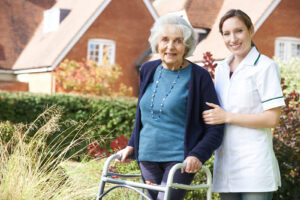How to Encourage Seniors to Get Socially Active Again

Companion care at home can help seniors stay socially and physically active.
Social isolation and loneliness are big problems for aging adults. The emotional impacts from being socially isolated can lead to physical health problems if they’re ignored. Encouraging seniors to become socially active again can involve trying a few things out and bringing in helpers, such as companion care at home services.
Define Some Goals
It’s helpful to start with some goals for social engagement. Seniors may not always seek social interaction for the same reasons as others. For instance, they may not be worried about making friends who have kids like they did when they were younger. Their goals now may be around simply having someone to talk to.
Having an understanding of what seniors want and why allows family caregivers to help them find solutions that work for their needs. Open and honest conversations allow everyone to get to the root of the situation.
Identify Some Possibilities
What did seniors used to do when they were with other people? Everyone has different needs for social engagement, so in the past, some seniors might have been social butterflies while others might have been more introverted.
Sitting down and identifying some of the types of social interactions seniors have enjoyed in the past can help craft plans for the future.
Try Out Some Ideas
After gathering some ideas, give them a try. The best way to know for sure whether something is going to be helpful and enjoyable is for seniors to put those ideas to work.
Joining a club or trying out a new hobby could be a low-effort way for seniors to start spending time around others. And if they have trouble going to these events, then they may need some more help.
Get Them Some Support
Seniors who no longer drive might need help with transportation from companion care at home providers, for instance. Or they may need help with not only social engagement, but also daily tasks.
The good news is that professional companion care at home caregivers don’t just offer help with necessary tasks. They also genuinely enjoy spending time with seniors. They can fill some of the social gaps seniors might have.
Evaluate What Helps and What Doesn’t
Any process of encouraging seniors to be more socially engaged involves examining what helps them do so and what doesn’t. Taking the time to examine where changes actually help allows family caregivers to identify what else might work.
Seniors may be more open to trying new things, too, once they experience some success. Talking about how to make socializing easier can reduce a lot of the frustration seniors might experience when they think about trying new things.
As seniors age and face greater challenges, they may need to think more intentionally about how to remain socially engaged. If they’ve started to become more isolated, the plan may need to be a little more gentle at first.
Companion care at home providers can offer families the support that they need to make some of these changes. Companion care at home caregivers are also excellent at helping seniors to come out of their shells and take more social risks in a way that is more positive.
If you or an aging loved one is considering Companion Care at Home in Arlington, VA, please contact the caring staff at Butters Home Health Care today. (703) 371-2113
